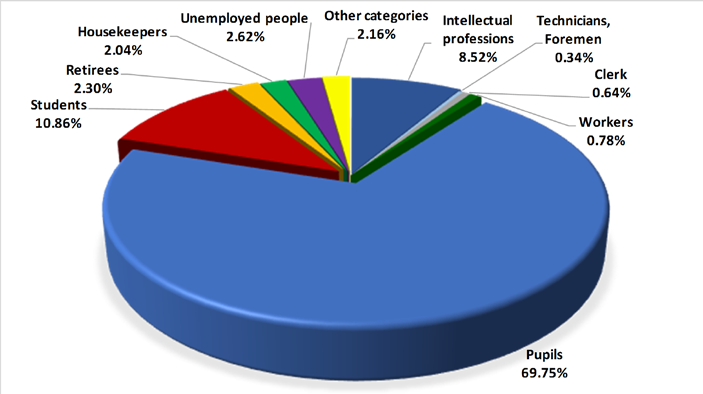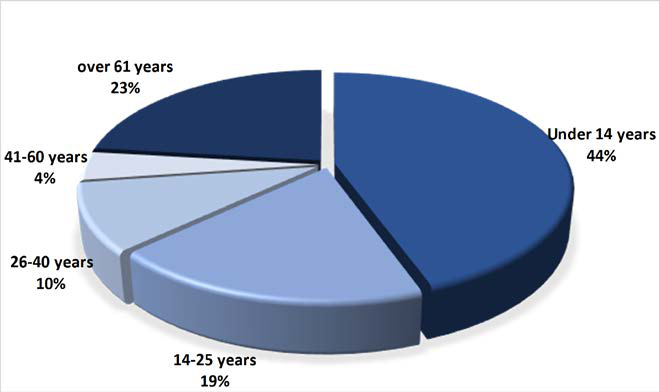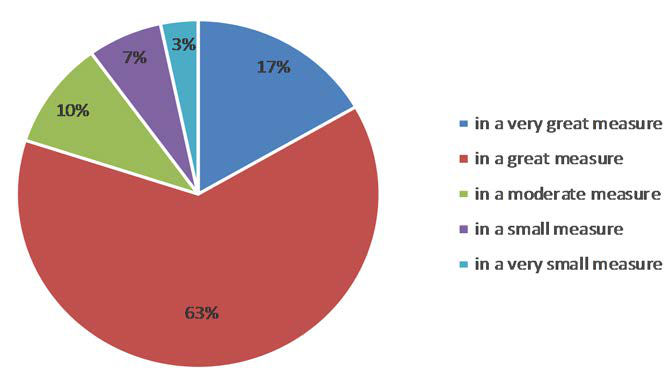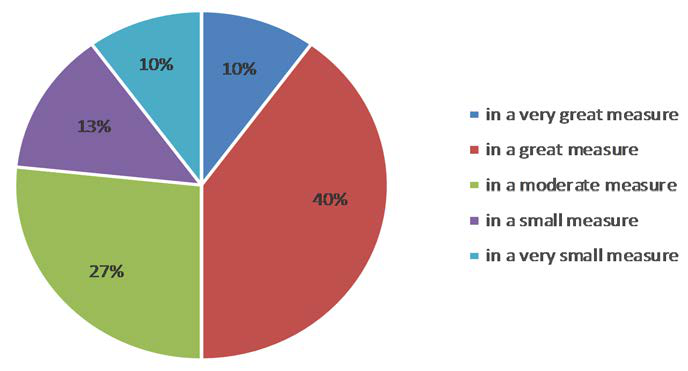Abstract
Nowadays, despite the fact that more and more pupils and students have access to scientific resources through the specific channels of new information and communication technologies, there are several gaps regarding its evaluation. Taking into account this reason, a series of global organizations have joined librarians on writing about the need to improve students’ information literacy development. It is very important for an educator to be able to guide the pupils and students on how to obtain useful information in the era of knowledge explosion. Recent research illustrated that this category of
Keywords: Scientific informationpublic libraryinformation literacyinformation evaluationnon-formal activitiesIRRESISTIBLE Project
Introduction
Just as in any activity area, holding and obtaining relevant and timely information has a positive
influence on the decisions adopted at any institutional level, information being considered a very
important resource along with the classical ones: work, nature, capital. It is known that information can
be accumulated constantly, yet it has, by excellence, a perishable character, a conclusive example in this sense being the expansion of the Internet (OECD, 2008). At the beginning of the 21st century, we faced an accelerated dynamics of the social changes, especially with their depth, as new development directions emerged on the educational level, aiming to align the instructive-educative objectives to the concrete demands of the knowledge-based society.
On the European level, things related to globalization, multi-culturalism or cultural diversity are becoming more and more intense mentioned (Dragicevic-Sesic, & Stojkovic, 2002), the educational domain being obliged to face the new trends and adapt itself to the technologically performant environment. In the above-mentioned context, the premises of the transition from the information society to the knowledge-based society have been created, where the individual is capable of understanding, evaluating and capitalization of information.
The role of the library on transferring of informational skills
At the basis of life-long learning, there are technological and research abilities. Without them we
cannot become informationally independent. Information-related skills are the first step towards the
realization of the educational objectives and those who can develop them are the specialists in the
information and documentation sciences, but also the teaching staff who needs to be involved in the
domain of the information-related activity, having the obligation to become aware that they are playing
the main role on ensuring the information culture. Unfortunately, there are some barriers in the creation
of a pertinent informational culture:
not knowing the documentary typologies;
not knowing the informational resources location strategies and techniques;
not knowing the forms and mode of information dissemination;
knowing the informational resources and their location, but finding it impossible to access them.
To be able to go over those barriers, we need to master the theories and the techniques of the
informational culture. The classical definition refers to
information to become, for the entire life, informationally independent” (ALA Presidential Committee
on Information Literacy, 1989). The basic elements of the informational culture involve the knowledge
on the information sources and their organization and mastering certain abilities:
precise definition of the needed information;
efficient determination of the location of the information sources;
critical evaluation of the informative elements and of the information sources;
integration of the information selected in the basic knowledge;
organization and communication of the information to other persons;
effective use of the information to realize the activity proposed;
ethical and legal use of the information;
synthesizing and building an added-value product based on the existing information.
The aim of the information culture is to provide to each individual with a minimal knowledge
allowing him/her to use information, to have diverse skills, in a context calling for informational
resources (Erich, 2007). According to a classical model of the information culture application, the
stages that each pupil, student, researcher etc. needs to go through are (Horton, 2008):
knowing the information and documentation structures (location, organization, services, offers);
library research training (knowing the services offered, the information sources etc.);
training on the use of information resources (finding the location and exploiting the information
regardless of the information source).
Lately the users have been obliged to face a continually growing of information production,
especially due to the fact that - regarding the Internet searching action – the filtering of the useful
information calls for specific abilities. Therefore, both informational culture and technological culture
have become indispensable.
The informational culture represents the primordial condition of the professionalism and success of
the future specialist in any area. Consequently, simultaneously to professional training, the
student/pupil needs to acquire habits and experience in relation to scientific information, developing his
informational skills. Both the specialists in information and documentation sciences, especially the
librarians, as members of the educational community, and the teaching staff involved in the domains
which claim activities that process the information, need to learn to play the main role on ensuring the
information culture.
Using their creative professional capabilities and possibilities, and relying on programmes integrated
in the training courses, they need to actively contribute to the educational process, helping the pupils on
their aspirations of accumulation and improvement, of cultivation of the habits and skills, knowledge
and values, necessary to continue to study throughout their lifetime.
The County library and its role as evaluator of the scientific information
In general, the County libraries - taking into account their structure and size of the collections, but
also the specificity of the products and provided services -, represent encyclopedically libraries,
offering also access to special and specialized collections, in order to answer to most diverse
information demands, from the simple reading for fun to the fundamental and applied scientific
research. Consequently, the typology of County libraries is extremely diversified. In this sense, we are
talking about:
-
o
degree, in relation to specific demands of the didactic and research activities. This type of users is
interested, as well, in the documents presented in the special collections of the County libraries, with
the view to be used in research activities. In order to meet the demands of this type of users, a much
more specific acquisitions policy is needed to be approached, an intrinsic collaboration existing
between universities and libraries, in order to avoid the acquisition of the same types of documents.
According to the new approaches in the area, we can even speak in this case about the transformation
of the County library into a
adults, interested especially on finding encyclopedic information;
children and teen-agers who represent a very important group which is treated with priority.
In the actual knowledge society, more young people prefer the Internet as an alternative to reading a
book, by example;
young
people skilled in the literary area for whom there are organized special programmes, thematic meetings, activities of presentation and promotion of their own creations;elderly people for whom a book itself has become aluxurious object that not everyone can afford;
-
public libraries, being a provider of services and products for this type of users, as well.
The role of the County library as evaluator of scientific information is more evident with the
occasion of various workshops or seminars in which pupils, students, but also their teachers are
involved. In general, approximately half of the readers are pupils and students, and this proportion can
be also easily retrieved in the participation to workshops and seminars organized by the County
libraries. As an example, in the case of “Ion Heliade Rădulescu” Dâmbovița County Library and in the
frame of the EU FP7 project entitled: “IRRESISTIBLE - Including Responsible Research and
Innovation in Cutting Edge Science and Inquiry-based Science Education to Improve Teacher's Ability
as main themes different activities related to
researchers and teachers who prepared and promoted those workshops, an important contribution was
done also by the librarians who searched and presented the most suitable books, articles or documents
which can be found in the library, regarding the chosen thematic area, after a fine process of evaluating
the scientific information.
Results and discussion
Referring to pupils, it is obvious that they are the main consumers of the information, being also the
most active users of the County library. As an example, in 2015, the number of active users (who came
to the County library for document loan services or study in the reading room) was 9183; Out of them,
a number of 3143 persons are newly-registered users. In this context, the number of active pupils was
4055 (44%), 928 being newly-registered users (30%).
Figure
pupils take a big slice in the diagram, having a great presence - as readers - in the life of the library.
According to their occupational status, among the active readers, the pupils (69.75%) are followed by
university students (10.86%), intellectual professional people (8.52%), unemployed people (2.62%),
retirees (2.30%) etc.

More than that, concerning the age of the users (Fig. 2) who came in 2015 to the library, the
statistics highlight that most of them are under 14 years old (44%) and over 61 years old (23%). Once
again, the pupils proved to be the main consumers of the information, becoming the main target group
addressed by the library.

Taking into account the previous facts, it was normal to propose and prepare a series of workshops
dedicated to pupils. In this respect, having the IRRESISTIBLEProject as principal mean for organizing
the non-formal activities in the County library -with the declared aim to design activities that foster the
involvement of young students and public in the process of
-, more than 300 pupils under 14 years old were called to participate in several workshops dedicated to
the
topic as important for their scientific knowledge. As presented in the figure, there is an important
proportion (80%) that considered that

During the workshops, near printed materials, small experiments and educational video-clips
(presented by the project researchers and educational experts), the pupils were introduced in the written
world of publications related to
scientific information, being also the main vector for transferring the knowledge. Several books and
scientific articles were introduced, but everything was done coming to the pupils’ level of
understanding, being adapted to their age. Having the status of novelty, discussions around
were held after the presentation and connections with the previous knowledge (a part of it also gained
in the library) were realized. In this sense, figure
to find out links with their previous scientific knowledge. Here, even 50% considered that they had that
capability, it remains an important proportion (other 50%) situated in the zone of
which are not part of the school curricula, as
gradually basis, making appeal and posing questions that could easily introduced the content in strong
relation with their previous scientific knowledge. On the other hand, the librarians must know very well
the actual content of the school curricula, in order to select and evaluate the proper information to be
presented to pupils. In addition, the role of multimedia must not be ignored. Matters related to

their previous knowledge
Conclusion
The County libraries have a major role on guiding the pupils in the process of retrieving the most
useful information. As the pupils represent the most active readers, their involvement in scientific
workshops organized in libraries (as non-formal activities) become crucial for making them to
understand cutting edge scientific issues, as
role, becoming a key person on selecting and evaluating the scientific information.
But the direct involvement of the librarian during the workshop activities is not an easy task. In
addition to the selection of the relevant documents, books or articles, the librarian must know the
school curricula and related contents in order to be able to raise the pupils’ interest for science, by
making connections with the pupils’ prior knowledge, motivating them and involving them in
educational quizzes or providing additional information using multimedia. The case of the
IRRESISTIBLE workshops proved to be suitable examples in this sense. On the other hand, the young
students’
formal education. Its importance became more and more obvious, especially during the activities
organized yearly, during the week: “School, inanother way: To know more, to be better!”.
Acknowledgements
This work was funded through the Seventh Framework Programme Project “
References
- ALA Presidential Committee on Information Literacy. (1989). Final report. Chicago: ALA.
- Dragicevic-Sesic, M., Stojkovic, B. (2002). Cultura: management, mediere, marketing. Timişoara: Brumar.
- Erich, A., & Tirziman, E. (2007). Informaţie și document în societatea cunoașterii. Târgoviște: Bibliotheca.
- Horton, F. W. (2008). Understanding information literacy: A primer. Paris: UNESCO.
- OECD (2008). Tertiary Education for the Knowledge Society, http://www.oecd.org/document/35/0,3343,en_2649_39263238_36021283_1_1_1_1,00.html
Copyright information

This work is licensed under a Creative Commons Attribution-NonCommercial-NoDerivatives 4.0 International License.
About this article
Publication Date
04 October 2016
Article Doi
eBook ISBN
978-1-80296-014-3
Publisher
Future Academy
Volume
15
Print ISBN (optional)
-
Edition Number
1st Edition
Pages
1-1115
Subjects
Communication, communication studies, social interaction, moral purpose of education, social purpose of education
Cite this article as:
Erich, A. T., & Gorghiu, G. (2016). The Role of the Library on the Evaluation of Scientific Information. In A. Sandu, T. Ciulei, & A. Frunza (Eds.), Logos Universality Mentality Education Novelty, vol 15. European Proceedings of Social and Behavioural Sciences (pp. 347-354). Future Academy. https://doi.org/10.15405/epsbs.2016.09.45

